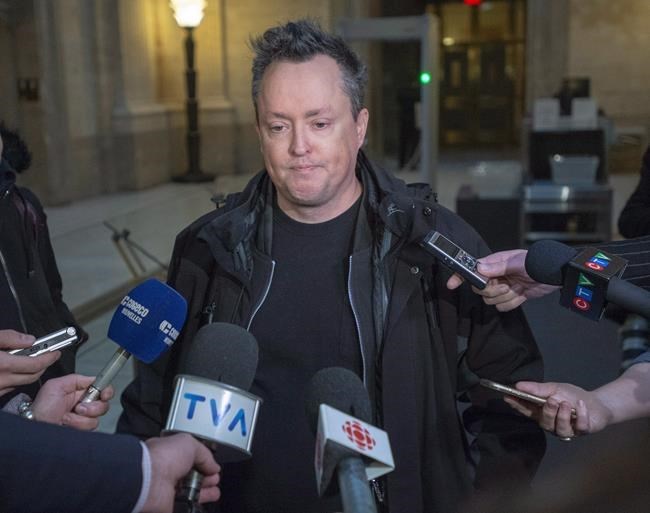Comedian Mike Ward's disparaging comments about a singer with a disability did not amount to discrimination under Quebec's rights charter, the Supreme Court of Canada has ruled.
In a 5-4 judgment Friday, the high court set aside a decision ordering Ward to pay damages for mocking Jérémy Gabriel, saying a discrimination claim must not become a defamation action.
The high-profile case pitted artistic expression, in the form of dark comedy, against the protection of one's dignity.
Gabriel, who has Treacher Collins syndrome — a congenital disorder characterized by skull and facial deformities — became a celebrity in Quebec after he appeared alongside Céline Dion and the Pope.
In his act, which took aim at well-known figures considered beyond mockery, Ward joked he thought Gabriel's illness was terminal and people were only nice to him because he would soon die.
Ward then joked that after he realized the child was not going to die, he tried to drown him.
Ward also made a video, posted on his website, in which he made derogatory comments about Gabriel.
In 2016, Quebec's human rights tribunal ordered Ward to pay $35,000 in moral and punitive damages to Gabriel based on the remarks.
The Quebec Court of Appeal ruled two years ago that Ward's comments compromised the young performer's right to his dignity and could not be justified, even in a society that values freedom of expression.
Ward has defended himself by saying comedy is not a crime. "In a 'free' country, it shouldn't be up to a judge to decide what constitutes a joke on stage," Ward has tweeted. "The people in attendance laughing already answered that question."
A majority of the Supreme Court concluded that the elements of a discrimination claim under the Quebec charter had not been established in the case.
"A discrimination claim is not, and must not become, an action in defamation," said the decision. "The two are governed by different considerations and have different purposes. A discrimination claim must be limited to expression whose effects are truly discriminatory."
The court said Quebec's rights charter, which elevates freedom of expression to a fundamental freedom, "was not enacted to encourage censorship."
As a result, "rude remarks" do not in themselves constitute discrimination under the charter, but there could be "very specific circumstances" where the statute does apply, the court said.
In this case, Ward singled out Gabriel not because of his disability but because he was a public figure, meaning the mockery falls outside a prohibited ground in the rights charter.
Moreover, the court added, Ward's comments met neither element of a test for resolving the conflict between the fundamental rights invoked by the parties.
A reasonable person would not view Ward's comments as inciting others to vilify Gabriel or to detest his humanity on the basis of a prohibited ground of discrimination.
In addition, the comments, considered in their context, could not be viewed as likely to lead to discriminatory treatment of Gabriel, the majority said. Rather, the remarks exploited, rightly or wrongly, a feeling of discomfort in order to entertain, but did little more than that.
In a dissenting opinion, four members of the court found Ward's remarks could not be justified in the circumstances and the tribunal was entitled to grant punitive damages.
Ward's lawyer, Julius Grey, called it "a great day for liberty."
Comedians, actors, writers and professors "will be able to rest more easily" knowing it is only for very serious matters that they can be taken to human rights tribunals — "that we have not yet reached the state where one cannot criticize or say unpopular things."
The Canadian Civil Liberties Association also welcomed the decision, having argued as an intervener that artistic expression requires that limits on the freedom are as narrow and precise as possible.
Gabriel expressed disappointment, but said he accepted the court decision and had no regrets about taking part in the legal fight.
Gabriel told a news conference in Montreal he would have liked to discuss the issue directly with Ward, particularly that he had thought of killing himself over the comedy act and how he faced intimidation during the period.
“I would want to tell him about how I felt when I first heard the jokes, about how I tried to end my life, how it felt as a 13-year-old to think about dying because a 40-year-old man says you should die, you think that’s the right thing to do,” Gabriel said.
“I would want to tell him if today I weren't here to talk about it because I would have taken my own life, how would he feel? How would he react? Would he talk about freedom of speech?”
For his part, Ward said in a video posted to Facebook late Friday he was relieved with the decision and did what any comedian would do under the circumstances by fighting.
“I didn’t want to be the one who created a precedent for other comedians,” he said, adding it wasn't the place of a human rights commission to decide the legality of a comedy act.
“For those who say it was mean, you have a right to your opinion … that’s the beauty of humour, particularly dark humour,” Ward said. “If you don’t like it, don’t come see me, don’t come see my shows.”
Ward ended his message by wishing Gabriel good luck, happiness and success in the future.
Gabriel said even though the legal process is now over, the societal debate is not and one of his missions will be to inspire people to be themselves, accept themselves and defend themselves if they are going through unacceptable situations.
“Equality is for everyone, I still firmly believe that."
This report by The Canadian Press was first published Oct. 29, 2021.
Jim Bronskill and Sidhartha Banerjee, The Canadian Press




